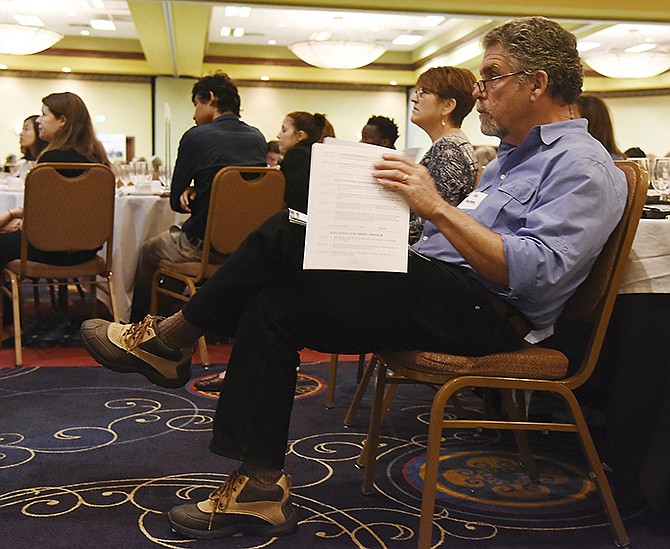With a collective passion in serving low-income individuals, nearly 350 people from across the state gathered in Jefferson City to discuss ways of lifting 908,000 Missourians out of poverty.
Participants in the fourth Missourians to End Poverty (MEP) poverty summit represented school districts, county and city governments, community action groups, faith-based organizations, government agencies, nonprofits and private businesses. Heidi Lucas, chair of MEP, said they all came to the conference seeking approaches to tackling issues surrounding poverty to take back to their individual communities.
“It takes every part of the community to make a difference,†she said. “Our focus today is on community-level solutions. Sometimes people get frustrated with what’s going on at the federal level or statewide, when what’s going on at the local level can really make a difference in people’s lives.â€
Jessica Long, Missouri Association for Community Action marketing and communications manager, said almost one-third of Missouri jobs are in low-wage occupations, and the average income of residents in 95 Missouri counties is below average. Since 2005, an additional 160,000 Missourians are in poverty (the Great Recession is partially to blame), and 20 percent of those are children, she added.
State Treasurer Clint Zweifel said combating poverty is a shared responsibility within a community, but not all see it that way. The naysayers, he said, sometimes believe society is unable to fix the problem, or they label poverty as a “byproduct of the American economic system.†Zweifel said others blame those in poverty for their circumstances, which are sometimes beyond their control.
To tackle poverty, Zweifel said, there needs to be a change in this attitude.
“Missourians to End Poverty forces us to realize that poverty isn’t just some sort of uncontrollable force,†he said. “It’s something that can be reckoned with; it’s something that can be dealt with; it’s something that can be stood up against; and — to some extent — we can work to alleviate it in some tangible ways.â€
Janie Dunning, state director of rural development, served as the keynote speaker and dispelled myths surrounding rural poverty, specifically. Laying out the realities, she said:
• There is more poverty in rural areas than in urban areas;
• Homelessness is an urban and rural problem, but it is more difficult to track homelessness in rural areas;
• Most people in poverty want to work, and those who do, do not make living wages;
• The majority of those in poverty do not live off government welfare because they are making more than the income level requirements for assistance;
• Most living in rural poverty are not in a minority group;
• Poor families are often times in temporary spells of poverty, but there are higher rates of persistent poverty in rural areas.
Low-income families living in rural areas also face being long distances from nutritional food sources and employment opportunities, she said, and some don’t have broadband access.
“They are geologically and technologically challenged,†Dunning said.
On a statewide basis, Lucas said, MEP supports an earned income tax credit (EITC), a benefit for working Missourians of low-to-moderate income levels, outlined in two bills presented this session. There is a federal EITC, and 26 states, along with the District of Columbia, have enacted their own versions.

